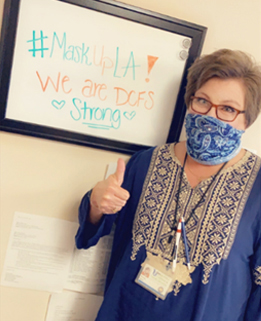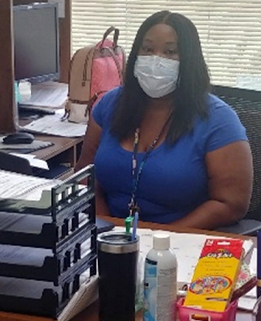Working from Home and the Office during a Pandemic: The Experience of Louisiana Child Welfare Workers
Staff from the Louisiana Department of Children and Family Services, Child Welfare Division (CWD), like many other child welfare professionals from across the country, have been heavily affected by the COVID-19 pandemic. CWD caseworkers had to adjust to working at home, interacting with families differently, and remaining connected to colleagues via technology. It was, according to some staff, difficult and challenging at times. CWD staff in three parishes that have implemented the job redesign in partnership with the Quality Improvement Center for Workforce Development (QIC-WD) were asked to provide some insight into their experience of working during the pandemic. The following are some of their responses:
What are ways you continue to build on relationships with your team while working hybrid (mix of time working from home and office)?
Kimberly Daigle, Lake Charles Permanency Unit: My partner and I work extremely well together, probably because we have been working together so long. We talk to each other on the phone daily - sometimes 7 or 8 times a day. The team as a whole stays in contact by phone and Skype.
Lauren Tillman, East Baton Rouge (EBR) Permanency Unit: We have weekly huddles – ensuring everyone feels supported.
Precious Mouton, Lafayette Prevention Unit: Since working hybrid we communicate via text, emails, and huddles with the team. Child Protective Services (CPS) usually checks in with Family Services (FS) workers to give a heads up of a potential case that may be transferred to FS, usually before a case is officially staffed into FS.
How do you handle distractions when working from home?
Kimberly Daigle, Lake Charles Permanency Unit: There are many distractions at home. My children for one know when I am working and have been good about leaving me alone. The other distractions are knowing that I have to fix them lunch and supper and take care of them so I sometimes will pester them more so than them pestering me.
Lauren Tillman EBR Permanency Unit: Usually I have minimal distractions as I have a home office set up. Fortunately, my children are old enough to understand that I am working and they are able to meet their own needs with minimal involvement from me.
Precious Mouton, Lafayette Prevention Unit: I don’t have many distractions from home. The main distractions since working hybrid are more phone calls during the day from family and friends. When I get an unrelated call and the first question is, “Are you working from home or the office?” I’ve learned to quickly say, “From home, BUT I’m in the middle of something.” That usually ends the conversations quickly.
How do you celebrate successes and accomplishments of your team?
Lauren Tillman, EBR Permanency Unit: I send an email and give verbal praise during unit meetings and/or team huddles.
Precious Mouton, Lafayette Prevention Unit: Celebrating success since going hybrid is usually expressed through text message or calls. We may not be able to speak on conference calls as a team right when it happens, but when speaking with our supervisor she makes sure to acknowledge that person or our good deeds.
How do you coordinate with your team members to remain aligned and focused on outcomes?
Kimberly Daigle, Lake Charles Permanency Unit: Communication among team members is priority and without that we would not be able to stay focused on outcomes. All we want at the end of the day is for all of our children to go home to their parents even though we know that it’s not always possible. Seeing these children suffer and wanting to go home causes a trauma for the child, as well as for the social worker. We feel these things and having a supervisor or partner that we can talk to makes all the difference.
Lauren Tillman, EBR Permanency Unit: Weekly teaming meeting and individual meetings as needed.
Has your life/work balance improved by working hybrid or was it better when you were in the office full-time? Explain.
Kimberly Daigle, Lake Charles Permanency Unit: When DCFS initially set into play the implementation of the job redesign, I was nervous at times not knowing what to expect. However, my life/work balance has been amazing since the implementation. When we were told we needed to work from home, that is when things became difficult. I ended up getting out of my routine and finding myself struggling daily with depression. But then we were able to go back to the office! I was excited and grateful because that is my home away from home! My depression was gone! I was back there working and was able to accomplish all that I couldn’t from home. When in the office I am successful!
Lauren Tillman, EBR Permanency Unit: Balance has improved working hybrid. I am available for my family if needed as I am home (especially with children participating in virtual classes), but still able to fulfill my duties and can go into the office/field when necessary.
Precious Mouton, Lafayette Prevention Unit: I prefer working from the office full-time. If I had a bad day, visit, or those pesky incidents continue to pop up at the office, my relief was going home. Sitting in my car for about 5 minutes to ensure work vibes, stressors are gone and home life is about to begin. With working from home, I find myself not having anywhere to escape. I tend to travel outside of my home, even if it’s just to the gas station just to get a drink, (don’t worry my mask and sanitizer accompanies me) just to escape the vibe of work and sitting inside all day.
The QIC-WD has curated a variety of tips and strategies from the research to help workers and supervisors cope with the stressors of working during a pandemic. Check out these blog posts for more information:

